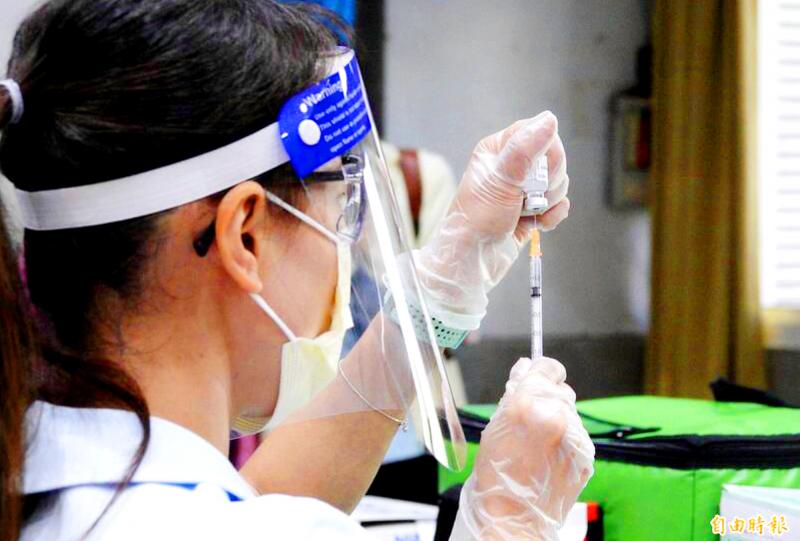Democratic Progressive Party Taipei mayoral candidate Chen Shih-chung (陳時中) yesterday defended the government’s position to keep its COVID-19 vaccine procurement costs confidential, saying that the practice is common in other countries.
The Chinese Nationalist Party (KMT) caucus on Friday said it was surprised to find out that, according to the National Audit Office, the Ministry of Health and Welfare had classified the COVID-19 vaccine procurement data confidential and that the information would remain sealed for 30 years.
The documents cannot be publicly disclosed until Feb. 25, 2051, not even to legislators, preventing the opposition from monitoring how taxpayers’ money has been spent during the COVID-19 pandemic, the KMT said.

Photo: Chen Kuan-pei, Taipei Times
Chen, who stepped down as minister of health and head of the Central Epidemic Command Center last month to focus on his Taipei mayoral campaign, said on Friday that the cost of the vaccines are covered by a confidentiality clause in the contracts, and that the medicine procurement commonly requires a nondisclosure agreement.
KMT Legislator Johnny Chiang (江啟臣) on Saturday wrote on Facebook that the Classified National Security Information Protection Act (國家機密保護法) says that data are classified as confidential if “the disclosure of the information could reasonably be expected to cause exceptionally grave damage to the national security,” and therefore the government should explain what “grave damage” could be caused by disclosure of vaccine expenses.
The act also says that information should not be classified as confidential for the purposes of “concealing violations of law or administrative error,” “restraining fair competition,” “preventing embarrassment to a person, corporate entity, organization, or agency,” and “preventing or delaying the public release of information that should be publicized,” and therefore the government should also say for which of these reasons the information is being kept secret, Chiang said.
KMT Taipei City Councilor Hsu Chiao-hsin (徐巧芯) on Saturday asked why the government cannot disclose what it paid for COVID-19 vaccines when Japan did so in April, as did Taiwan Semiconductor Manufacturing Co and the Hon Hai Precision Industry Co-affiliated Yonglin Foundation, which donated Pfizer-BioNTech vaccines to the government.
Chen said that Taiwan faces more external interference than other countries or entities, and must be careful to avoid disclosing information that could be used in harmful counteractions.
Only one European country revealed its vaccine procurement costs, and that was by accident, Chen said, adding that this fact is just to the best of his knowledge.

Chinese spouse and influencer Guan Guan’s (關關) residency permit has been revoked for repeatedly posting pro-China videos that threaten national security, the National Immigration Agency confirmed today. Guan Guan has said many controversial statements in her videos posted to Douyin (抖音), including “the red flag will soon be painted all over Taiwan” and “Taiwan is an inseparable part of China,” and expressing hope for expedited reunification. The agency last year received multiple reports alleging that Guan Guan had advocated for armed reunification. After verifying the reports, the agency last month issued a notice requiring her to appear and explain her actions. Guan

A preclearance service to facilitate entry for people traveling to select airports in Japan would be available from Thursday next week to Feb. 25 at Taiwan Taoyuan International Airport, Taoyuan International Airport Corp (TIAC) said on Tuesday. The service was first made available to Taiwanese travelers throughout the winter vacation of 2024 and during the Lunar New Year holiday. In addition to flights to the Japanese cities of Hakodate, Asahikawa, Akita, Sendai, Niigata, Okayama, Takamatsu, Kumamoto and Kagoshima, the service would be available to travelers to Kobe and Oita. The service can be accessed by passengers of 15 flight routes operated by

GIVE AND TAKE: Blood demand continues to rise each year, while fewer young donors are available due to the nation’s falling birthrate, a doctor said Blood donors can redeem points earned from donations to obtain limited edition Formosan black bear travel mugs, the Kaohsiung Blood Center said yesterday, as it announced a goal of stocking 20,000 units of blood prior to the Lunar New Year. The last month of the lunar year is National Blood Donation Month, when local centers seek to stockpile blood for use during the Lunar New Year holiday. The blood demand in southern Taiwan — including Tainan and Kaohsiung, as well as Chiayi, Pingtung, Penghu and Taitung counties — is about 2,000 units per day, the center said. The donation campaign aims to boost

The Central Weather Administration (CWA) said a magnitude 4.9 earthquake that struck off the coast of eastern Taiwan yesterday was an independent event and part of a stress-adjustment process. The earthquake occurred at 4:47pm, with its epicenter at sea about 45.4km south of Yilan County Hall at a depth of 5.9km, the CWA said. The quake's intensity, which gauges the actual effects of a temblor, was highest in several townships in Yilan and neighboring Hualien County, where it measured 4 on Taiwan's seven-tier intensity scale, the CWA said. Lin Po-yu (林柏佑), a division chief at the CWA's Seismological Center, told a news conference